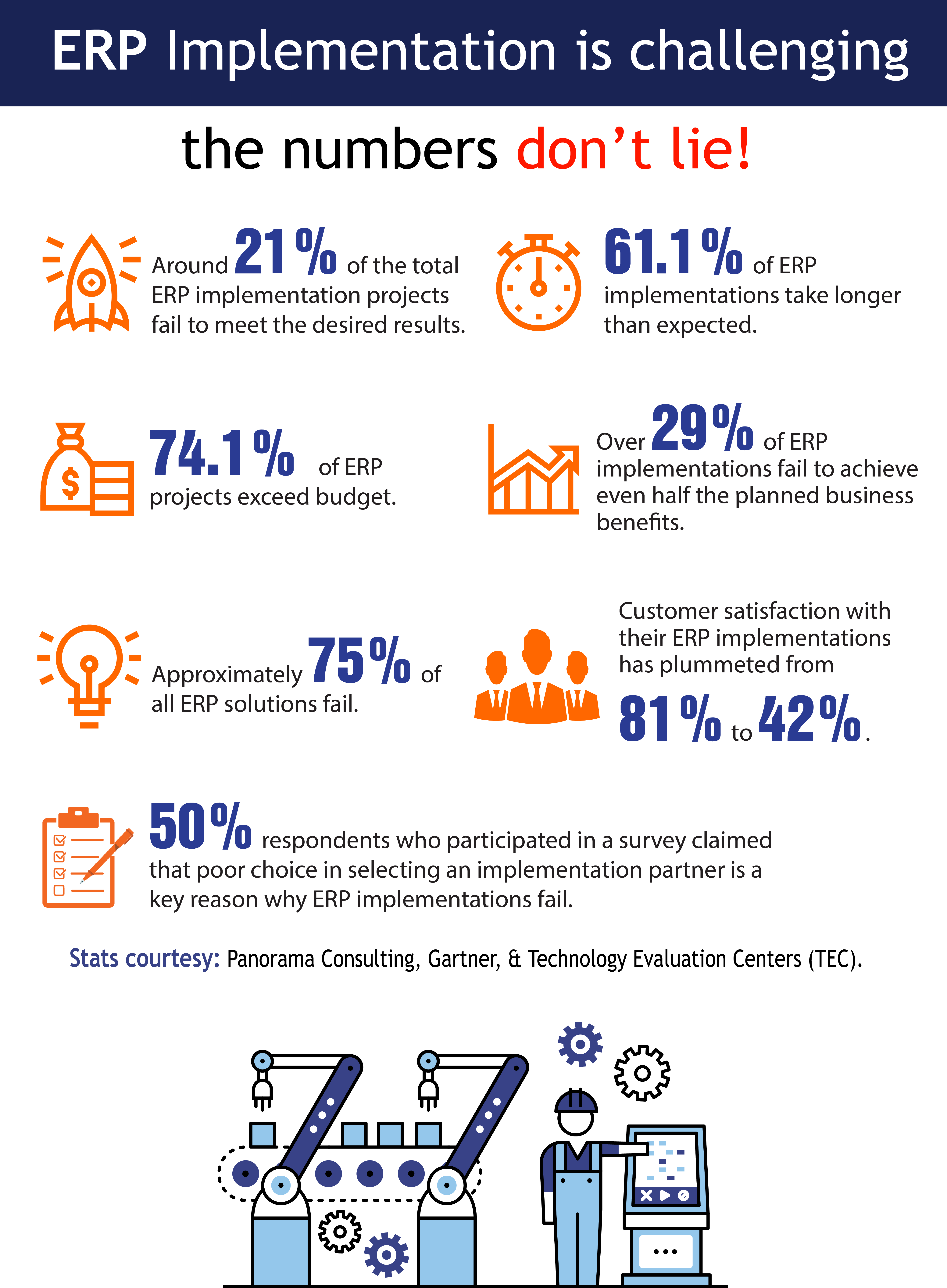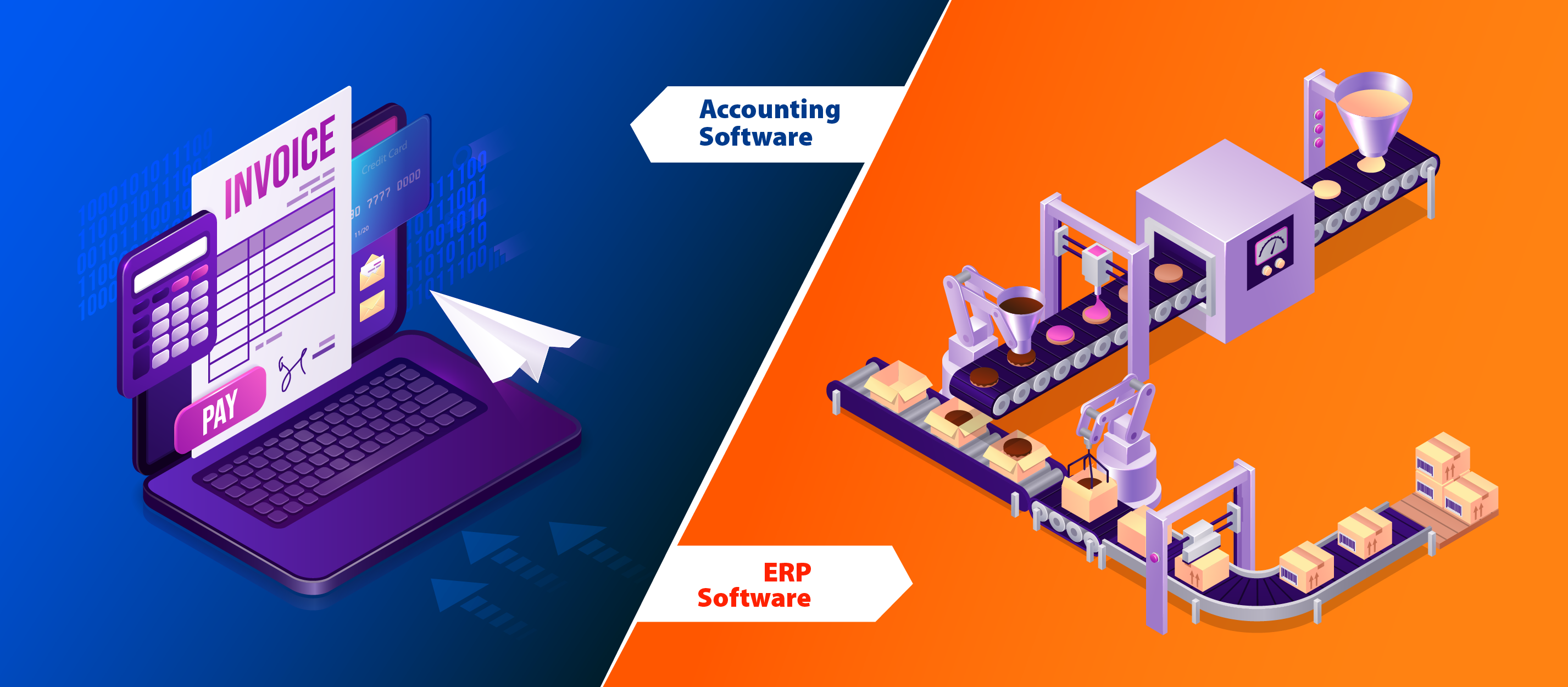
For a business, of any type, size, and from any industry, an enterprise resource planning (ERP) software has become a useful business management tool over the years.
And opting for it isn’t tough anymore, but implementing it is. In fact, implementing an ERP software is a challenging task on so many levels.
There is too much at stake – exorbitant amount of money, valuable business data, precious man-hours, and other organizational resources, apart from the business reputation, which could go for a toss in case of a failed implementation. One mistake, and it could spell disaster for the organization.
In the past, there have been numerous instances of failed ERP implementations. Some top of the mind recalls include Avon, whose ERP project worth $125 million failed after four years of work, and the US Air Force ERP project, which bombed even after investment of seven years and a billion dollars going into it.
There are many such cases, which drive home the point that pulling off a successful ERP Implementation is indeed a challenging task.

Statistics back up this claim too!
- An independent research by Panorama Consulting revealed that around 21 percent of the total ERP implementation projects fail to meet the desired results.
- The study also revealed that 61.1 percent of ERP implementations take longer than expected and 74.1 percent of ERP projects exceed budget.
- Another industry report claims over 29 percent of ERP implementations fail to achieve even half the planned business benefits.
- A research carried by Gartner suggests approximately 75 percent of all ERP solutions fail.
- Another Panorama Consulting research claims customer satisfaction with their overall implementations has plummeted from 81 percent to 42 percent, suggesting more companies are struggling with their deployments.
- In a survey conducted by Technology Evaluation Centers (TEC), 50 percent of the respondents claimed that poor choice in selecting an implementation partner is a key reason why ERP implementations fail.
But the question arises, why does this happen?
An ERP implementation project may fail for a number of reasons. So, what exactly makes ERP implementation a challenging task? Let’s take a look at the reasons below:
Analysis of requirements:
It is important for businesses to thoroughly analyze the existing business processes in order to gather information on requirements from the prospective ERP system, and to figure out whether it can seamlessly integrate with the operations or not.
Failing to do so, the users may miss out on certain essential functionalities, and the ERP may not achieve its objective of fixing the holes in the business.
Selecting the right tool as well as partner:
Selection of the wrong ERP system, as well as vendor, is a major reason why ERP implementations fail- a claim that’s well backed-up by stats.
Thus, carefully selecting the right ERP tool as well as implementation partner who aligns with your business needs and can help achieve the objectives, makes successful ERP Implementation a challenging task.
Ensuring environment compatibility:
It is important to determine whether the prospective ERP system will be compatible with your existing IT infrastructure, as some systems are known to work only with certain hardware configurations.
Besides, compatibility issues may crop up with few ERP modules while integrating them with your business processes. Handling these compatibility issues makes ERP implementation challenging.
Keeping the cost under control:
Majority of businesses fail to allocate appropriate budget for the ERP implementation project, which often goes beyond its scope.
This results in cost overheads on multiple fronts, which makes keeping the cost as well as overall implementation project under control, a challenging task.
Communication:
Lack of communication between your organization and the ERP vendor can make things challenging, and massively impact the outcome of the project.
To make it a success, it is important the key stakeholders remain on the same page.
And that can only be possible if the flow of communication is seamless.
Data management:
Managing your business data through the ERP implementation project is particularly challenging.
It may so happen that you end up losing valuable data, or might be left with data that’s inaccessible by the time the implementation is complete.
It again comes down to selecting the right partner who can handle data migration and integration without losing its quality.
Picking right people for the job:
Having the right mix of people overseeing your ERP implementation project is extremely important.
Businesses need to invest time in picking the ideal employees from the key departments, and across hierarchical levels, along with the ones who will be using it on a daily basis, to the ERP team.
Failing to do so can make implementation a daunting exercise.
Time management:
Successful ERP Implementation is a complex process; one, that needs time. Some businesses go for outright implementation, and end up creating confusion, chaos, and a host of other challenges.
The process can be made less challenging, if it’s executed in stages, just one step at a time. This will ensure that all the key business requirements are met.
Change management:
One of the biggest issues organizations face while implementing an ERP is the challenge of managing change.
If the employees don’t embrace change, and rather prefer to do things the way they’ve been doing, the whole exercise becomes pointless.
The key here is to take everybody on board, and have change management plans in place for processes, technology, and people.
Training & support:
One big reason why change management is a challenge for businesses is lack of proper training & support.
If the employees and ERP users within the organization are provided with appropriate training and support during and after implementation, they will be more likely to accept change and at the same time, be better prepared to move ahead as a cohesive unit in order to achieve the business objectives.
In sum
So now we know why successful ERP Implementation is a challenging task.
It is pertinent for the organizations to analyze their requirements well, select the right ERP as well as vendor, keep the budget under control, ensure system compatibility as well as seamless flow of communication between the stakeholders, manage time, data, and importantly, change, and have uninterrupted training & support.
By ensuring the aforementioned points are duly put in place, organizations can keep the challenges involved in ERP rollout at bay, and guarantee a successful ERP implementation.
A simple way of doing it is by selecting BatchMaster’s ERP solutions for your process manufacturing business, and getting the implementation partner who’s best in the business. Talk to us to know more, or to schedule a free demo.



















